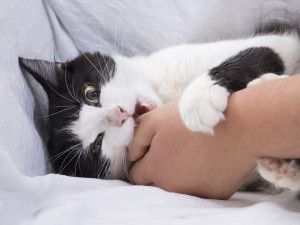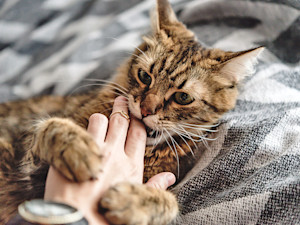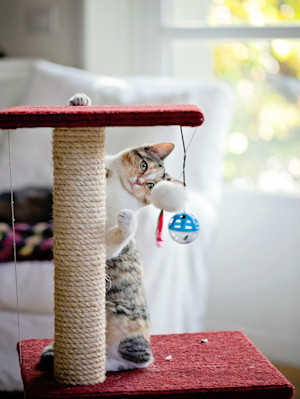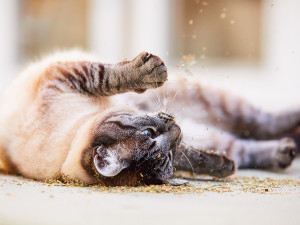Why Does Your Cat Bite Your Ankles—and What to Do About It
When your cat is cute, but their behavior isn’t.
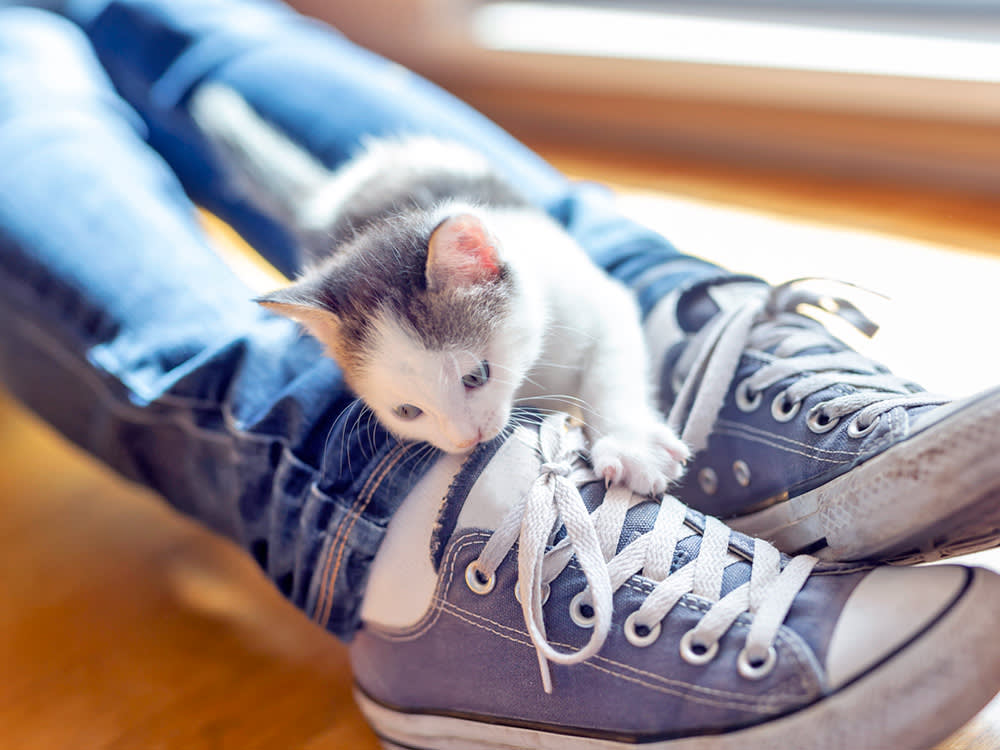
Share Article
In This Article:
Common Reasons Your Cat Bites Your Ankles How to Prevent Your Cat From Biting Your Ankles When to Get Professional Help
In this common cat parent scenario, one moment you’re strolling barefoot across the living room floor, the next a fur ball streaks out from under the couch and sinks its teeth into your ankle. This painful event known as ankle-biting doesn’t mean your cat is inherently aggressive and will sever your jugular in the night. It just means you might want to cover your feet with a thick pair of socks until you’re not a moving target.
Seasoned cat parents understand ankle-biting as part of normal playful, predatory cat behavior. New cat parents however can experience alarm, not to mention pain.
Sylvie Sterling, the CEO and founder of Feline Soul Academyopens in new tab, is a cat expert and licensed cat psychologist and behaviorist and says there are many reasons your kitty may be into biting your ankles, “and it’s usually not what people think!”

Common reasons your cat is biting your ankles
Deepak Shuklaopens in new tab, founder of Pets Let’s Travelopens in new tab and cat parent to Jenny, understands how confusing it can be when your cat starts biting your ankles. “I’m a cat owner myself, and my cat Jenny has definitely had her moments of mischief, including a few ankle-biting episodes! Based on my experience, there are a few common reasons why cats like Jenny engage in this behavior.”
Hunting instincts
Cats have natural hunting instincts, so they may be chasing after your ankles because they want to exercise some of that hunting-style play. “Cats are a predatory species,” Dr. Marci Koski, certified feline behavior and training consultant at Feline Behavior Solutionsopens in new tab, told Kinship in a previous interview. “They are barely domesticated and programmed to hunt, so if we don’t give them those opportunities through play, they can get bored, which can lead to depression, destructive behaviors, stress, house soiling, aggression, and more.”
Based on her own experience, Shukla knows that cats sometimes just see their parents as a moving target. “When you walk around, especially if you’re moving quickly, they may see your ankles as a target. “It’s something that’s almost instinctual for them,” Shukla says. “Jenny, for example, would often pounce on my ankles like they were prey, especially when she was younger and more playful.”
Playtime
Sterling advises making your home a cat-friendly environment where your cat can exert themselves, both physically and emotionally. “Always make sure your cat has enough toys and things to play with or climb on or scratch on or do any type of physical activity,” she says.
Attention-seeking or boredom
Sterling adds that when cats seem to “want attention,” they’re communicating something surprising. “They are really trying to show us humans that we are stressed out! That we are not happy. That we are restless, or that we are angry,” she says. “Cats are very empathetic and they always feel our emotional states and our moods. So, when we humans are going through emotional ups and downs without noticing that we are in a certain state, then our cats will come to us and alert us to the fact that we need to relax or destress or just notice that we are not happy. By clawing us or biting us, they are trying to get us to pay attention to that fact!”
Boredom can play a role as well. Cats are curious, playful creatures who need regular stimulation, especially if they live indoors. Build in daily playtime, set up a cat tower or install a window shelf to keep your cat entertained and mentally engaged. Cristin Tamburo, cat behaviorist, told us that 10 to 15 minutes a day of play is a good general guideline.
She adds: “Younger cats and kittens generally have a lot more energy and will stay engaged in play longer than older cats, so I recommend, whenever possible, to play with your cat until they tire out.”
Stress or anxiety
Sadly, many kittens are taken too early from their mother and littermates, which Sterling says results in poor socialization. “Their mother couldn’t teach them not to be rough or not to bite the humans.” Or, she says, “They don’t have a sibling to play with or socialize with, so they’ll take your feet for playtime and stimulation of their senses.”
Stress and anxiety contribute to aggressive behavior like biting (which again doesn’t mean your cat is aggressive by nature). Think about recent changes in your cat’s environment or routine. Do you have a new pet? Guests in the bedroom with the litter box or loud noises from construction next door?
Sterling says just as humans release stress with a punching ball or other objects, so do cats. “Sometimes they need to release pressure,” she says, which goes back to building an environment that meets their needs.
Medical conditions
Medical conditions like arthritis can make cats irritable, leading them to bite.
Behaviorist Karen London wrote for Kinship that pain in cats often causes cats to perform behaviors you may not have seen before: “If a cat suddenly exhibits behavior that has never been seen before, the reason for the new behavior could be pain. It’s not unusual for a hurt cat to become agitated, or even aggressive — especially if touched or startled. Sometimes, a cat who is suffering physical pain will uncharacteristically begin eliminating outside of the litter boxopens in new tab. That can be because it hurts them to enter the box or because they experienced pain while in there.”
If your cat is also biting when you pick them up, consider a trip to the vet to rule out physical issues.
Teething or dental issues
Kittens and puppies have the urge to bite when they’re teething. Shukla says when Jenny was younger, she went through a teething phase where she bit everything in sight. “This natural process can cause some temporary chewing behaviors, so if you have a kitten, ankle-biting might just be a phase they grow out of,” he says.
When Jenny got older and began experiencing dental issues, she was also more likely to bite. “Dental pain or joint problems can sometimes cause cats to act out, and it’s always a good idea to get them checked if the behavior feels unusual,” Shukla says.
How to prevent your cat from biting your ankles
Here’s some homework for cat parents: Avoid overreacting to random attacks. Don’t ever lash out at your cat when they bite your ankles (that includes raising your voice, pointing a spray bottle at them, or chasing them). That can lead to fear-based aggression, which is a larger problem than episodic ankle-biting. Instead, say “ouch” loudly, then gently move away from your cat. In their mind, they didn’t get the attention they might have been seeking.
Shukla redirects Jenny’s attention to a toy or engages her in play sessions. “Interactive toys, such as feather wands or laser pointers are great for keeping them entertained and off your ankles,” Shukla says. “I’ve also learned that providing enough mental stimulation and positive reinforcement when she plays gently has worked wonders in curbing the ankle-biting behavior.”
Provide adequate playtime
In order to get your cat to stop habits you don’t want (like ankle-biting), you need to engage with them more. Mikel Delgado, animal behaviorist, cat behavior consultantopens in new tab, and author ofopens in new tab How to Play With Your Cat, told Kinship that most people don’t even understand that their cat likes and wants to play. She recommends setting time aside every day to make sure you’re engaging with your cat (or encouraging solo play) so they can use their energy that way, and not for turning your ankles into chew toys.
“I saw this potential issue where either people didn’t understand how to play with their cats, or they didn’t recognize play in their cats, or they didn’t know how to play,” she told us in an interview. “To me, a natural antidote to that is encouraging play and activity in our cats. Just like when we exercise, we get an endorphin rush, and it kind of takes our mind off our problems; I want people to do the same thing with our cats.”
Behavioral training
Behavioral training with positive reinforcement is the best way to encourage your cat to ask for things without biting your ankles. When your cat appropriately asks for food and attention (like by meowing, sitting and looking at you calmly, rubbing against your legs), respond with treats, playtime, and any reward your cat understands to be positive.
LeeAnna Buis, animal behaviorist and cat behavior consultant at Feline Behavior Solutionsopens in new tab, wrote for us that it’s important to start your cat’s training as young as possible. But working with positive reinforcement throughout their life is just an important: “Whether in a formal training session where you’ve given a cue and they’ve followed it, or you happen to catch your kitten doing something you want to encourage, like using the scratching post instead of the couch, reward it! Rewarded behaviors are more likely to be repeated. This is the best way to train your kitten (or cat of any age).”
Ensuring a stimulating environment
This goes back to making sure your cat has enough to keep them from getting bored when you’re away from home or busy. This is especially important for indoor cats. Catnip toys, scratching posts, puzzle feeders, a window perch, or even a cardboard box will engage and entertain them in your absence.
When to get professional help from a vet or trainer
As we mentioned earlier, it’s important to take your cat to the vet if you think any of your cat’s behavior could be just manifestations of their pain. Never wait to talk to someone if you think this is the case; it’s important to rule out any health concerns or underlying issues.
Persistent or aggressive behavior
Cats will temporarily exhibit aggressive behavior for several reasons. If the biting persists or appears to be linked to health issues, it’s best to consult a veterinarian for a check-upopens in new tab.
Stress or anxiety indicators
If your cat exhibits other signs of stress (such as litter box avoidance, excessive vocalization, and hiding), ankle-biting may be one more way their anxiety is showing itself. If you’re hosting a party, or your house is full of people and your attention is diverted at a time when they normally expect attention, your cat will feel confused and anxious and may bite your guests’ ankles. The kindest thing you can do for your cat is to give them a quiet place behind closed doors and reconnect when the guests leave.
FAQs
Why does my cat like my ankles?
Your cat likes your ankles because your ankles are the right height to bite. As confusing as it may be, ankle-biting happens for many reasons, such as playfulness or boredom (see above). However, if this becomes persistent behavior, you should seek advice from a vet.
Why does my cat randomly attack my ankles?
Cats randomly attack ankles because they are probably in a hunting mood, feeling bored, or are being playful. For all those reasons, your ankles serve as irresistible moving targets. Remember to stay calm, and redirect the behavior. Your ankles will thank you.
References
Kate Boatright, V. M. D. “Behavioral Signs of Feline Pain.�” Dvm360, vol. 52, 6 July 2021, www.dvm360.com/view/behavioral-signs-of-feline-painopens in new tab.

Catherine Fahy Green
Catherine Fahy Green is a journalist turned copy and content writer. As a pets writer, she focuses on and is fascinated by animal body language because there's so much to learn from and about animals by spending time in their presence and observing their physical cues.
Her work as a PR specialist appears in national trade media as press releases and stories about exciting new products people should try. She lives with her family in Western Massachusetts, where she listens closely to the stories her two dogs, flock of chickens, and four horses tell her. She spends her weekends at horse shows with her daughter.
Related articles
![Cat playing with scratching post.]()
How to Train and Get Your Cat to Use a Scratching Post
You can stop your cat from scratching everything in sight.
What Is the Best Antibiotic for Cat Bites?
When playtime gets a little rough, here’s how to take care of yourself.
![A cat rolling around in catnip on the floor.]()
Get This: While Your Cat Is High on Catnip, They’re Also Repelling Pests
Duuuude...where are the mosquitos?
Love Bite or Aggression? This Is Why Your Cat Licks Then Bites You
Cats can be such enigmas.

